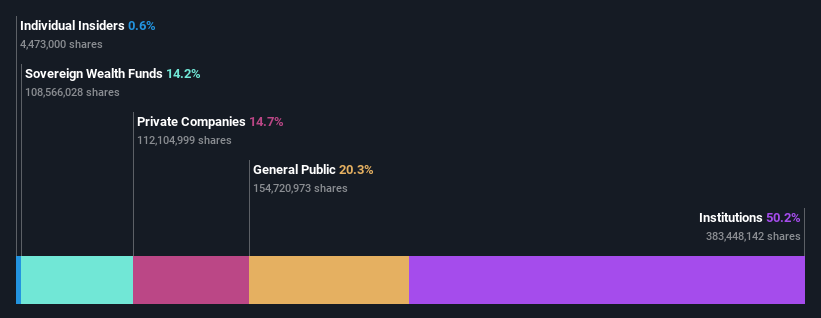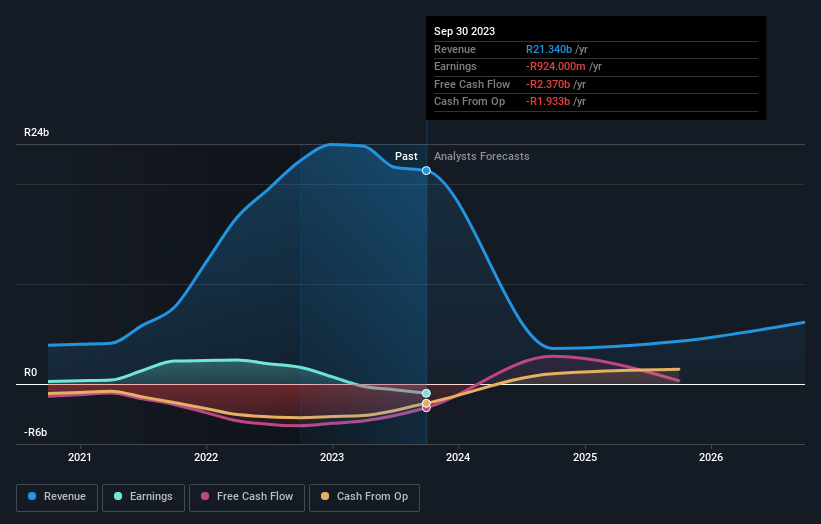- South Africa
- /
- Professional Services
- /
- JSE:TCP
Institutional investors may adopt severe steps after Transaction Capital Limited's (JSE:TCP) latest 18% drop adds to a year losses

Key Insights
- Significantly high institutional ownership implies Transaction Capital's stock price is sensitive to their trading actions
- 54% of the business is held by the top 5 shareholders
- Insiders have been selling lately
If you want to know who really controls Transaction Capital Limited (JSE:TCP), then you'll have to look at the makeup of its share registry. The group holding the most number of shares in the company, around 50% to be precise, is institutions. That is, the group stands to benefit the most if the stock rises (or lose the most if there is a downturn).
As a result, institutional investors endured the highest losses last week after market cap fell by R1.3b. This set of investors may especially be concerned about the current loss, which adds to a one-year loss of 39% for shareholders. Also referred to as "smart money", institutions have a lot of sway over how a stock's price moves. As a result, if the decline continues, institutional investors may be pressured to sell Transaction Capital which might hurt individual investors.
Let's delve deeper into each type of owner of Transaction Capital, beginning with the chart below.
See our latest analysis for Transaction Capital

What Does The Institutional Ownership Tell Us About Transaction Capital?
Many institutions measure their performance against an index that approximates the local market. So they usually pay more attention to companies that are included in major indices.
We can see that Transaction Capital does have institutional investors; and they hold a good portion of the company's stock. This implies the analysts working for those institutions have looked at the stock and they like it. But just like anyone else, they could be wrong. When multiple institutions own a stock, there's always a risk that they are in a 'crowded trade'. When such a trade goes wrong, multiple parties may compete to sell stock fast. This risk is higher in a company without a history of growth. You can see Transaction Capital's historic earnings and revenue below, but keep in mind there's always more to the story.

Since institutional investors own more than half the issued stock, the board will likely have to pay attention to their preferences. Transaction Capital is not owned by hedge funds. Looking at our data, we can see that the largest shareholder is Coronation Fund Managers Limited with 25% of shares outstanding. Public Investment Corporation Limited is the second largest shareholder owning 14% of common stock, and Royal Bafokeng Holdings (Pty) Ltd holds about 5.0% of the company stock.
To make our study more interesting, we found that the top 5 shareholders control more than half of the company which implies that this group has considerable sway over the company's decision-making.
Researching institutional ownership is a good way to gauge and filter a stock's expected performance. The same can be achieved by studying analyst sentiments. There are plenty of analysts covering the stock, so it might be worth seeing what they are forecasting, too.
Insider Ownership Of Transaction Capital
The definition of an insider can differ slightly between different countries, but members of the board of directors always count. The company management answer to the board and the latter should represent the interests of shareholders. Notably, sometimes top-level managers are on the board themselves.
I generally consider insider ownership to be a good thing. However, on some occasions it makes it more difficult for other shareholders to hold the board accountable for decisions.
Our information suggests that Transaction Capital Limited insiders own under 1% of the company. But they may have an indirect interest through a corporate structure that we haven't picked up on. It has a market capitalization of just R6.2b, and the board has only R36m worth of shares in their own names. Many tend to prefer to see a board with bigger shareholdings. A good next step might be to take a look at this free summary of insider buying and selling.
General Public Ownership
With a 20% ownership, the general public, mostly comprising of individual investors, have some degree of sway over Transaction Capital. While this group can't necessarily call the shots, it can certainly have a real influence on how the company is run.
Private Company Ownership
It seems that Private Companies own 15%, of the Transaction Capital stock. Private companies may be related parties. Sometimes insiders have an interest in a public company through a holding in a private company, rather than in their own capacity as an individual. While it's hard to draw any broad stroke conclusions, it is worth noting as an area for further research.
Next Steps:
I find it very interesting to look at who exactly owns a company. But to truly gain insight, we need to consider other information, too. Take risks for example - Transaction Capital has 4 warning signs (and 2 which can't be ignored) we think you should know about.
Ultimately the future is most important. You can access this free report on analyst forecasts for the company.
NB: Figures in this article are calculated using data from the last twelve months, which refer to the 12-month period ending on the last date of the month the financial statement is dated. This may not be consistent with full year annual report figures.
Valuation is complex, but we're here to simplify it.
Discover if Transaction Capital might be undervalued or overvalued with our detailed analysis, featuring fair value estimates, potential risks, dividends, insider trades, and its financial condition.
Access Free AnalysisHave feedback on this article? Concerned about the content? Get in touch with us directly. Alternatively, email editorial-team (at) simplywallst.com.
This article by Simply Wall St is general in nature. We provide commentary based on historical data and analyst forecasts only using an unbiased methodology and our articles are not intended to be financial advice. It does not constitute a recommendation to buy or sell any stock, and does not take account of your objectives, or your financial situation. We aim to bring you long-term focused analysis driven by fundamental data. Note that our analysis may not factor in the latest price-sensitive company announcements or qualitative material. Simply Wall St has no position in any stocks mentioned.
About JSE:TCP
Transaction Capital
Provides a range of business services in South Africa.
Good value slight.

